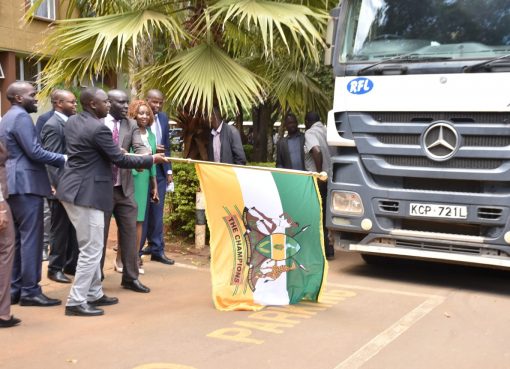The government, in partnership with the Food and Agriculture Organization (FAO) and the Green Climate Fund (GCF), has launched a Sh6.4 billion initiative to revolutionize agriculture in the Lake Region.
The six-year project dubbed “Transforming Livelihoods through Climate-Resilient, Low-Carbon, Sustainable Agricultural Value Chains in the Lake Region Economic Bloc” targets 14 counties and aims to boost food security, empower smallholder farmers, and promote climate-smart agriculture.
Speaking during the launch in Kisumu County, Cooperatives Principal Secretary (PS) Patrick Kilemi said the project will focus on six priority value chains, including dairy, poultry, coffee, tea, fruit trees, and African leafy vegetables.
With a target of supporting 140,000 farmers, including 80,000 cooperative members and 63,000 farmers’ groups, the initiative aims to build climate resilience and drive the agricultural sector towards a low-carbon, sustainable future.
The project has been designed to strengthen access to climate-smart agricultural information and services, restore degraded agricultural landscapes and increase Smallholder Climate Resilience – Promoting low-carbon technologies that improve yields while reducing greenhouse gas emissions.
This, according to the PS, was in line with the government’s plan to scale up food security while achieving some low carbon emissions.
“This project is not just about mitigating climate change effects; it is about transforming agriculture into a profitable, sustainable venture,” he said.
Consequently, by increasing yields and lowering input costs, we are securing farmers’ livelihoods while reducing environmental impact, added Kilemi.
The State Department for Cooperatives, he said, was at the centre of the project as an enabler of the pillars of the Bottom Up Economic Transformation Agenda (BETA), emphasizing the importance of cooperatives in transforming the lives of farmers.
Dairy and coffee value chains, which are part of the value chains in the project, form a big percentage of the cooperative movement, with millions of farmers reaping benefits directly and indirectly.
The PS challenged the leadership of Kisumu, Siaya, Homa Bay, Migori, Kisii, Nyamira, Kericho, Bomet, Nandi, Vihiga, Kakamega, Bungoma, Busia and Trans Nzoia counties, where the project is being implemented to rally farmers to join the cooperative movement to reap maximum benefits.
“The cooperatives will ensure knowledge transfer and sustainability of these interventions beyond the project’s duration,” he said.
FAO Country Representative Dr. Nyabenyi Tipo said besides boosting food security, the project will help address severe financial gaps in total climate change mitigation and adaptation expenditure in the country.
She said smallholder farmers and producer cooperatives have been worst hit by the impacts of climate change, adding that through the initiative they stand to play a critical role in mitigating the effects of the phenomenon.
“Strengthened cooperatives and farmers’ organizations are crucial in addressing climate change in Kenya’s agricultural and environmental sectors, as they enable collective action, allowing farmers to pool resources, share knowledge, and advocate for climate policies effectively,” Tipo said.
Implementation of the project will focus on sustainable intensification, diversification, youth engagement and strengthened cooperatives and farmers’ organizations.
“Sustainable intensification is crucial for addressing climate change as it aims to increase food production on existing agricultural land while minimizing environmental impacts,” noted the FAO country representative.
Through this initiative, she said, job opportunities will be created, stimulating economic growth, essential for poverty alleviation and food security.
Additionally, young people will be empowered to facilitate knowledge and skills transfer between generations, combining traditional practices with modern approaches to effectively tackle climate-related challenges in agriculture.
LREB Vice Chairman Kenneth Lusaka said the project was a bold step towards ensuring food security and economic stability for millions of farmers in the region.
“This is more than just farming; it’s about securing livelihoods. By leveraging Artificial Intelligence (AI), precision agriculture and climate risk analytics, we can optimize resources and enhance food security,” he said.
Lusaka who is also the Governor for Bungoma County, said LREB was committed to driving sustainable agriculture to attract investments and position the region as a leader in climate-smart farming.
By Chris Mahandara





